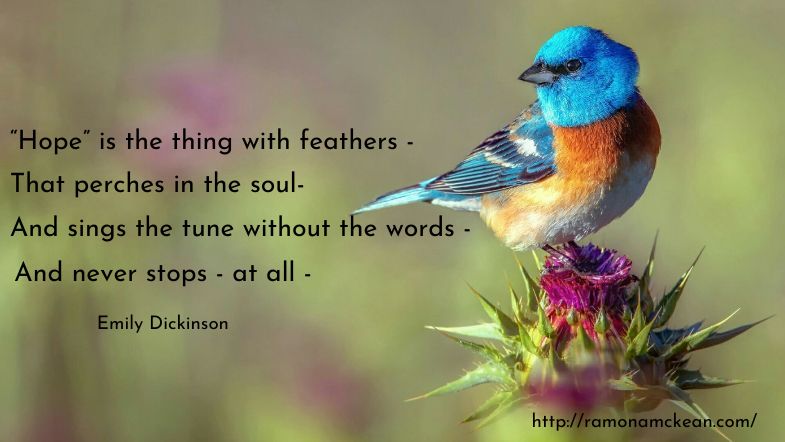
What’s So on “the Outside”
These are heavy times; some call them “evolutionary times.” The crumbling of the old is causing confusion and disillusionment. That there is no clear indication of the new (and how can there be at this stage?), is causing wide-spread fear. This is most dramatically apparent in the USA, but really, we are all affected, everywhere. We can’t fool ourselves.
Think politics and pay cheques, polarization and pandemic, racial and social divides, injustice, conspiracy theories and climate crisis, and so on. External stress is known to ramp up the difficult emotions of whatever unresolved personal and inherited traumas we carry. For many, these are on the unconscious level, hence more problematic. Emotions are meant to be processed, to keep moving through and out, in appropriate ways. Trouble is, the difficult ones—anger, sadness, fear, frustration, etc.—are getting more stuck and more activated.
Is there a way to “rise from the fatigue of despair to the buoyancy of hope” (Martin Luther King)?
Is it any wonder that so many people are dispirited, tight, edgy, exhausted and SCARED? (This all, of course, can affect our physical well-being.) Our poor central nervous systems…! Is there a way, to use Martin Luther King’s words, to “rise from the fatigue of despair to the buoyancy of hope”?
It’s at times like these that the poets can help provide a shift in perspective, along with clarity and a good dose of calm. When I came across Emily Dickinson’s poem the other day, I smiled! “Hard and heavy,” at least for a while, yielded to simple and light. Some of you may remember this lovely little poem from school days. Here it is in its entirety:
“Hope” is the thing with feathers –
That perches in the soul –
And sings the tune without the words –
And never stops – at all –And sweetest – in the Gale – is heard –
And sore must be the storm –
That could abash the little Bird
That kept so many warm –I’ve heard it in the chillest land –
And on the strangest Sea –
Yet – never – in Extremity,
It asked a crumb – of me.
What’s So on “the Inside”
Emily Dickinson is “reminding” us of something we may not have consciously thought of before. It’s that hope is “hard-wired” (but in a gentle, soft way) into the very fabric of our being. Hope is always there, a part of our soul, “singing a tune without the words.” Indeed, its language is not words. Hope operates on a feeling level, not a cognitive. (Right brain rather than left).
This “capital-H” Hope is not an outcome-specific hope, the kind that’s in service to our everyday desires. (Not that there is anything wrong with this kind.) For example: “I hope he phones.” “I hope I get the job,” “I hope so and so wins.” Small-h hope is of the ego and mind. It has a grasping quality. Capital-H Hope is of the heart and spirit. It has an expansive, generous quality.
“There are these three things that endure: Faith, Hope and Love” (I Corinthians 13:13).
“Perched” in the soul, capital-H Hope has an aerial view (like a little bird). Attuning with it lifts us above the insanity of the fray and helps us see through a wider-than-normal lens. We gain perspective. We open to a world of possibility, which can lead to creativity. Hope breathes life and light into our weary mortal selves. A quality of soul, it stands with Faith and Love. “There are these three things that endure: Faith, Hope and Love” (I Corinthians 13:13).
This Delicate “little Bird”
This delicate “little Bird,” Hope, will not forsake us, even when the going gets toughest (“the Gale”). Indeed, that’s when it is exulted, sings “sweetest.” Though small, this “feathered” Hope is potent, persevering, resilient and faithful. Nothing can “abash” (shame or embarrass) it. It only gives and asks for nothing.
Now here is some child-like sweetness (by Ezra Tillman), which I hope you’ll enjoy. 🙂
How Can We Access Capital ‘H’ Hope?
When times are tough, it may be pretty hard to access Hope, to feel its presence. Perhaps it’s about cultivating a kind of receptivity? From my own experience, here’s what may help when capital H Hope doesn’t seem to be there for us.
1. SELF-CARE. I’ve discovered that the more I’m able to look after myself (physically, mentally, emotionally, spiritually), the better it is all way around.
2. QUIET. On the outside,… perhaps not till the middle of the night. On the inside,… it’s likely another story, given heavy emotion and yattering mind.
3. Here is where KINDNESS comes in, aka, SELF-COMPASSION, a form of self-care. We need to accept the very thoughts and feelings that are troubling us. It’s human nature to resist what doesn’t feel good, but resistance keeps us stuck. The yuck just gets stronger. It’s like an unruly little kid who tests us by demanding that we pay attention and accept them. “If you don’t acknowledge me and show me you still love me, then I’m going to scream even louder!” Take a big breath, exhale it fully, then unbegrudgingly pay attention to the child.
Persistent troublesome thoughts and feelings are really just “unruly children” within ourselves, demanding our love, self-love.
Ram Dass used to call these difficult demanding parts “shmoos.” The more he practiced accepting them, the smaller they got, then they were his “little shmoos.” He’d say, “Oh, resentment? You’ve come to visit me again? Come on in. Here, let’s have tea.” Yes, patience, inner hospitality and practice. That last word should be capitalized: PRACTICE, cuz that’s exactly what helps us be more ready/receptive.
[Tara Brach, another spiritual teacher, shares a beautiful little Buddhist practice called RAIN. I find it helpful. Perhaps you will too.]
4. PATIENCE. Don’t be hard on yourself, dear soul. Take it easy. Remember to breathe and pause. All the dashes in Emily Dickinson’s poem can be taken as reminders to pause! Mindful inhales and exhales give more space around difficult thoughts and feelings. More space means more ability to relax and breathe.
5. GRATEFULNESS. Deliberately thinking of anything that makes us feel good in a wholesome way and dwelling in the feeling can be profoundly helpful. I think of people, some passed on already, who I appreciate and love. Good emotional memories, real or made up, are useful. (Your brain won’t know the difference.) Dwell in the love and gratitude.
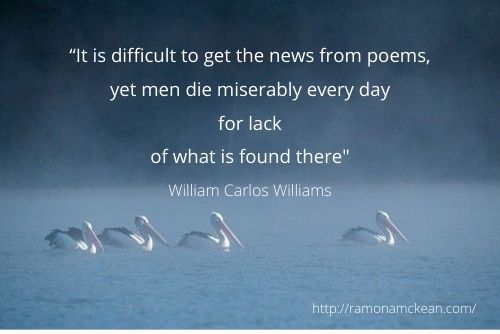
6. Expose yourself to BEAUTY. Like how about poetry? Shut off the news! Then read a poem or go outside and look at the fragile wonder of a falling leaf or feel the wispy wonder of breeze against your skin. Getting present to simple beauty helps soften the hard and open us to the little Bird in our hearts.
And Sometimes…
And sometimes we don’t have to do anything! We can be mired in masses of pain and suddenly Hope is just there, a “visitation,” a gift of Grace. When that happens, we smile, laugh or cry. Our heart’s been touched. We know the little Bird really is there, and it is singing. We’re not alone.


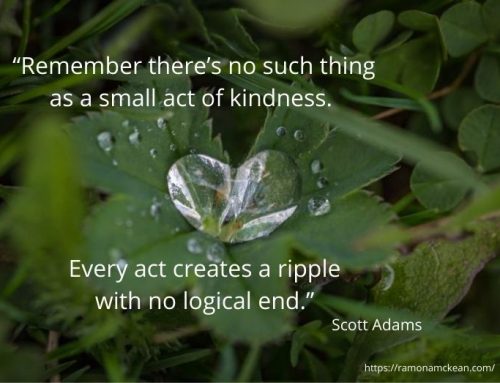
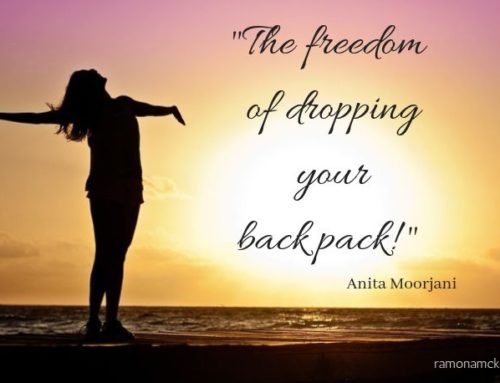

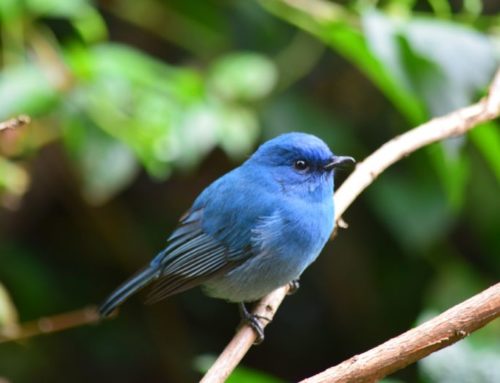
This is a lovely sweet post. Poetry is a balm for our soul, in these challenging times.
To a New Year of Capital H Hope. Thanks, Ramona for your thoughtful, gentle insight.
Poetry can indeed be a balm for our soul, Elaine! I wrote about another of my favourites a few years ago. You may like it too: http://ramonamckean.com/edna-st-vincent-millays-gods-world/. And then if we consider the “poems” that are song lyrics, then Leonard Cohen’s words and melodies are often truly balm! I love his “If it Be Your Will”: http://ramonamckean.com/if-it-be-your-will-a-tribute-to-leonard-cohen/ and, of course, his classic “Hallelujah”: http://ramonamckean.com/music-to-build-bridges-cohen-kd-and-hallelujah/.
Thank you for your thoughtful comment, Elaine, and YES, may 2021 be a capital H year of Hope!
Dear Ramona, your posts and articles are always so wonderful to read and to experience (with the added touch of music and videos), and this one is exceptional. Thank you for sharing your insight and your light.
Clarke, thank you so much. I put a lot of heart, soul and mind (reflection) into what I write. Gestation can be such a lengthy and frustrating process sometimes. I definitely need to be gentle and patient with myself, my creative process, I guess. I’m really glad you liked what I wrote.
Dearest Ramona(明心), it always feels healing to read your writings. I agree this is a heavy time when we can easily feel hopeless and helpless. But LOVE can definitely save us from desperate situations. For example, an email or a message from a dear friend can bring love and hope to you. In that sense, I am grateful for our long-lasting friendship, Ramona! Your friendship and sharing warm my heart and soul.
Yes, beautiful things can bring hope too. I remember I shared a poem some time ago, it reads:
“I can be an enemy of another person,
but how can I be an enemy of a glowworm?
How can I be an enemy of a garden?
How can I be an enemy of dancing breeze…”
When I read the poem, my body felt happy and my mind was at peace. Thus hope instilled into me. No doubt self-care can bring hope. To gain self-care, I get myself close to nature by taking a walk in the wild; I share poems and music with friends. Music is part of my daily life. Anyway, God helps those who help themselves.
You, Ramona, are a light and a poem of hope in my life. Thank you very much for sharing this wonderful article with me!
Songhe, you are so dear! Yes, we have been friends for a long time, since I first went to China in the fall of 2004. You are a light in my life too! <3 I did not mention love, did I? And yet it is the most important thing! "Faith, Hope and Love, but the greatest of these is Love."
And I think you are right in quoting the old proverb: "God helps those who help themselves." It's like the Divine (God, Universal Energy, Source, whatever anyone wants to call "it") really likes it when we get proactive and become active agents in our own well-being, even in the gentlest of ways. "God" is spurred into lifting us higher on our individual paths. We need to keep alert and listen to the promptings from our soul. The little Bird helps that way too, I'm sure.
Thank you for responding in such a warm way, "wo de qin ai'de pengyou"!
Dear Ramona, thank you so much for sharing your wisdom, kindness and hope! What a lovely heart warming poem by Emily Dickinson. Your wonderful suggestions on how to access H’Hope show your incredible insight to what is truly important. You made my day!
And, thank you, Michelle, for your encouraging comments, your “vote of confidence”! Sometimes I really do feel I have good insight and ideas; however, the big thing for me is getting unstuck and following through. It’s wonderful to have others to associate with who help us feel good about ourselves. This kind of connection–even if it’s a brief chat with that friendly cashier or person on a Zoom call–can make such a difference. Feeling good about ourselves and helping others to feel good about themselves is way up there! You said I “made your day.” Well, my dear, I think you’ve made mine too. 🙂
This a beautiful post Ramona. We definitely need hope at this time. I’m so happy you found and shared my song. It’s such a wonderful little poem. Thank you for spreading hope!
I am so pleased you responded, Ezra! Thank you! I searched through YouTube for videos about this lovely little Emily Dickinson poem. There were many. Some people were reciting the poem, others were talking about it and others, like you, put it to music. Yours was the sweetest and felt the most like “the little Bird” to me. It really IS about uplifting ourselves and others, isn’t it? Also known as spreading Hope in our world! Have a wonderful rest of your day. 🙂
Ramona, this is lovely, heart felt and thorough. People need this kind of reflection and encouragement. Thank you.
Thank you,Janyne.
Absolutely beautiful Ramona! Not a big surprise coming from you. Your spirituality and kindness shines bright and strong.
Beautiful words and a lovely exercise to remember.
Hope is our friend. It’s always there if we care to acknowledge it and reach out to its positive message.
Everyone can make a great difference in these uncertain times. Just like that beautiful little bird.
The choice is always there for us to take.
Michelle, thank you for your kind comment. I have to pay attention to what I write! Remembering self-compassion is a biggy for me, maybe it is for everyone. Presence too!
Love your ‘frame’ and page! We are all trying to be ‘warriors of light.’
Thank you, Barbara.